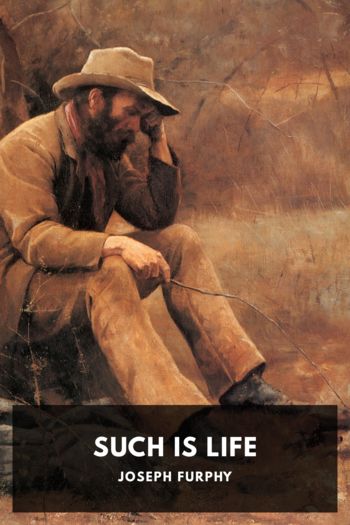Such Is Life - Joseph Furphy (philippa perry book txt) 📗

- Author: Joseph Furphy
Book online «Such Is Life - Joseph Furphy (philippa perry book txt) 📗». Author Joseph Furphy
“Longest night I ever passed, though it was one of the shortest in the year. Eyes burning for want of sleep, and couldn’t bear to lie down for a minute. Wandering about for miles; listening; hearing something in the scrub; and finding it was only one of the other chaps, or some sheep. Thunder and lightning, on and off, all night; even two or three drops of rain, toward morning. Once I heard the howl of a dingo, and I thought of the little girl, lying worn-out, half-asleep and half-fainting—far more helpless than a sheep—and I made up my mind that if she came out safe I would lead a better life for the future.
“However, between daylight and sunrise—being then about a mile, or a mile and a half, from the bell—I was riding at a slow walk, listening and dozing in the saddle, when I heard a faraway call that sounded like ‘Dad-dee!’. It seemed to be straight in front of me; and I went for it like mad. Hadn’t gone far when Williamson, the narangy, was alongside me.
“ ‘Hear anything?’ says I.
“ ‘Yes,’ says he. ‘Sounded like “Daddy!” I think it was out here.’
“ ‘I think it was more this way,’ says I; and each of us went his own way.
“When I got to where I thought was about the place, I listened again, and searched round everywhere. The bell was coming that way, and presently I went to meet it, leading my horse, and still listening. Then another call came through the stillness of the scrub, faint, but beyond mistake, ‘Dad-de-e-e!’. There wasn’t a trace of terror in the tone; it was just the voice of a worn-out child, deliberately calling with all her might. Seemed to be something less than half-a-mile away, but I couldn’t fix on the direction; and the scrub was very thick.
“I hurried down to the bell. Everyone there had heard the call, or fancied they had; but it was out to their right—not in front. Of course, the lubra wouldn’t leave the track, nor Bob, nor the chap with the bell; but everyone else was gone—Dan among the rest. The lubra said something to Bob.
“ ‘Picaninny tumble down here again,’ says Bob. ‘Getting very weak on her feet.’
“By-and-by, ‘Picaninny plenty tumble down.’ It was pitiful; but we knew that we were close on her at last. By this time, of course, she had been out for seventy-two hours.
“I stuck to the track, with the lubra and Bob. We could hear some of the chaps coo-eeing now and again, and calling ‘Mary!’—”
“Bad line—bad line,” muttered Saunders impatiently.
“Seemed to confuse things, anyway,” replied Thompson. “And it was very doubtful whether the little girl was likely to answer a strange voice. At last, however, the lubra stopped, and pointed to a sunbonnet, all dusty, lying under a spreading hop-bush. She spoke to Bob again.
“ ‘Picaninny sleep here last night,’ says Bob. And that was within a hundred yards of the spot I had made-for after hearing the first call. I knew it by three or four tall pines, among a mass of pine scrub. However, the lubra turned off at an angle to the right, and run the track—not an hour old—toward where we had heard the second call. We were crossing fresh horse-tracks every few yards; and never two minutes but what somebody turned-up to ask the news. But to show how little use anything was except fair tracking, the lubra herself never saw the child till she went right up to where she was lying between two thick, soft bushes that met over her, and hid her from sight—”
“Asleep?” I suggested, with a sinking heart.
“No. She had been walking along—less than half-an-hour before—and she had brushed through between these bushes, to avoid some prickly scrub on both sides; but there happened to be a bilby-hole close in front, and she fell in the sort of trough, with her head down the slope; and that was the end of her long journey. It would have taken a child in fair strength to get out of the place she was in; and she was played-out to the last ounce. So her face had sunk down on the loose mould, and she had died without a struggle.
“Bob snatched her up the instant he caught sight of her, but we all saw that it was too late. We coo-eed, and the chap with the bell kept it going steady. Then all hands reckoned that the search was over, and they were soon collected round the spot.
“Now, that little girl was only five years old; and she had walked nothing less than twenty-two miles—might be nearer twenty-five.”
There was a minute’s silence. Personal observation, or trustworthy report, had made every one of Thompson’s audience familiar with such episodes of new settlement; and, for that very reason, his last remark came as a confirmation rather than as an overstatement. Nothing is more astonishing than the distances lost children have been known to traverse.
“How did poor Rory take it?” I asked.
“Dan? Well he took it bad. When he saw her face, he gave one little cry, like a wounded animal; then he sat down on the bilby-heap, with her on his knees, wiping the mould out of her mouth, and talking baby to her.
“Not one of us could find a word to say; but in a few minutes we were brought to ourselves by thunder and lightning in earnest, and the storm was on us with a roar. And just at this moment Webster of Kulkaroo came





Comments (0)